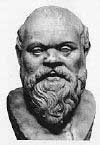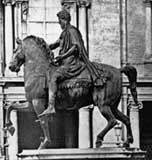

A Timeline of Hellenistic Philosophy
Dr. Cynthia Freeland




Introduction
"Hellenistic" refers to a broad time period roughly from the death of Aristotle in 323/2 B.C.E. up through the second century C.E. During this period the centers of intellectual inquiry in many fields shifted from Athens to other regions around the Mediterranean, as political power shifted, including both Rome and Alexandria in Egypt. The term "Hellenistic" derives from the Greek word "hellenizo" which means to "act Greek" or "Greekify." In short, this is a time period in which literature, art, architecture, and philosophy were all acutely conscious of a debt to (and sometimes feelings of inferiority to or derivativeness upon) classical Hellenic culture.In philosophy, the Hellenistic period was exceptionally rich and varied. Both the schools of Aristotle (the Lyceum) and Plato (the Academy) continued in Athens for some time; the Academy remained open until the 6th century C.E. There were important new discoveries in medical science and astronomy, among many other fields. Three new schools of philosophy arose, all claiming inheritance from Socrates (pictured at left above) as their chief inspiration. The Epicureans sought to live a simple life devoted to simple pleasures, conversation with friends, and the pursuit of prudence or wisdom as the key to living well. The Stoics were also devoted to pursuing wisdom but emphasized the goal of apatheia or passionlessness. And the Skeptics emphasized Socrates' wisdom lay in being aware of the extent of his ignorance; they felt that inquiry would lead both to doubt and eventually to relaxation of pursuit of dogma, or ataraxia: undisturbedness.
This timeline should help convey the sweep of the time period. There was extensive interaction among all three schools (with particularly vigorous debates between Stoics and Skeptics). There was also a general shift in all three schools from representation in Athens to a more general spread and popularity in Rome and other regions. Stoicism was especially popular in Rome and became virtually a state belief (almost a religion) there; adherents ranged across the social spectrum from the former slave Epictetus (above left center) to the Emperor Marcus Aurelius (two photos at right).
Epicureanism
"Philosophy of the Garden" Epicurus (Greek) 341-270 B.C. *School ("Garden") founded ca. 311 B.C. Lucretius (Roman) 99-55 B.C.
Stoicism
(the school of the "porch" or "colonnade") The Early Stoa (3rd. c. B.C., in Athens, in the "Stoa Poikile" = "Painted Porch") Zeno of Citium 336-264 B.C. *Founder of school, ca. 300 B.C. Cleanthes of Assos 331 - 232 B.C. Chyrsippus of Soli 280-206 B.C. (Engaged with Arcesilaus of the Academy) The Middle Stoa (1st and 2nd B.C.; introduced Platonic elements) Panaetius of Rhodes 185-110 B.C. Posidonius of Apamea 145-51 B.C. The Late Stoa (1st and 2nd c. A.D., Roman) Epictetus 50-138 A.D. (freed slave of one of Nero's bodyguards) Seneca 4 B.C. - 65 A.D (one of Nero's ministers) Marcus Aurelius 121-180 A.D. (became emperor in 161)
Skepticism
(the school of "skepsis" or "inquiry") Early ("Academic") Skepticism (associated with Plato's Academy) Arcesilaus Middle or "New" Academy) 315-240 B.C. Carneades (criticized Chrysippus) 213-128 B.C. Pyrrhonian (Later) Skepticism inspired by Pyrrho (Greek-speaking Phoenician, traveled with Alexander the Great to India, did not write anything) ca. 360 - 270 B.C. works written down by his student, Timon 320-230 B.C. 1st c. B.C. popularized by Sextus Empiricus (Rome? Athens? Alexandria?) 150-225 A.D.

Note: This page is in progress (Summer 2000).
Check back for additions and updates.URL for this page: http://www.uh.edu/~cfreelan/courses/Stoics/Timeline.html
Copyright © 2000, Cynthia A. Freeland. All rights reserved.
Last Updated May 21, 2000.
Stoicism Home Page